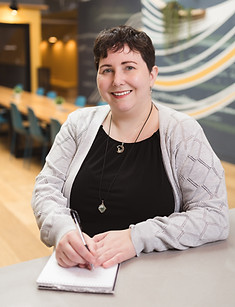Feeling stuck between where you are and what’s next?
The Career Change Starter Kit helps you create clarity without overwhelm.

You've wanted to change your career for a while...

Maybe your current path no longer aligns with your strengths, interests, or energy — even if it once did.
Maybe you’re craving a role that energizes you — one that respects your time, your needs, and allows you to do your best work.
Whatever’s pushing you — burnout, big goals, or just knowing you’re meant for more...
It’s time to move forward with clarity, strategy, and support.

Hi, I'm Ash
(they/them and she/her)
Yes, like the Pokemon Trainer.
I'm a Career Coach and Job Search Strategist.
I've helped over 6,000 professionals within the past 12 years gain clarity on what they want, confidence in their skills, and rebrand themselves.
My approach draws from my lived experience with ADHD and a TBI, my training and background in counseling, and my experience at Carnegie Mellon working with graduate students entering quantitative finance.
When We Work Together
I keep things practical and direct. I break goals into clear, step-by-step actions, and we tackle the work together during our sessions. You’ll always leave with next steps you can act on right away.
Between sessions, if you get stuck, you’re not on your own—you can text me. We’ll troubleshoot, adjust, or simply save it for our next meeting.
I don’t believe in one-size-fits-all strategies. If a checklist works for you, great. If not, we’ll toss it out and design a system that actually fits your brain and your life.
Who I Help
I work with Career Changers, Job Seekers, and Grad School Applicants. Some of my specialties include:
Your grad school & GPA can only get you so far when it comes to landing a highly competitive role in finance or STEM. Together, we’ll focus on an upskilling & recruiting plan that aligns with your target roles and find ways you can stand out to employers.
Most jobs weren’t built with neurodivergence in mind. Together, we'll find roles that allow you to thrive. Ones that interest you in environments that welcome your ideas and preferred workstyle.
Therapists & Clinicians
You love the work - but the high caseloads, endless notes, and constant demands aren’t sustainable. Whether you're an SLP, OT, counselor, or another helping professional, we’ll identify options beyond direct care that let you make an impact without the self-sacrifice.

...Or Explore Careers at Your Own Pace
with Your Career Change Starter Kit, featuring:
-
A Workstyle Assessment to describe how you naturally work best in the workplace.
-
A Transferable Skills Assessment to identify and organize which skills you enjoy using and which ones you want to grow.
-
Generative AI Prompts to guide you through career research.
-
And a Career Cheat Sheet to compile and compare different careers' education and skill requirements.


